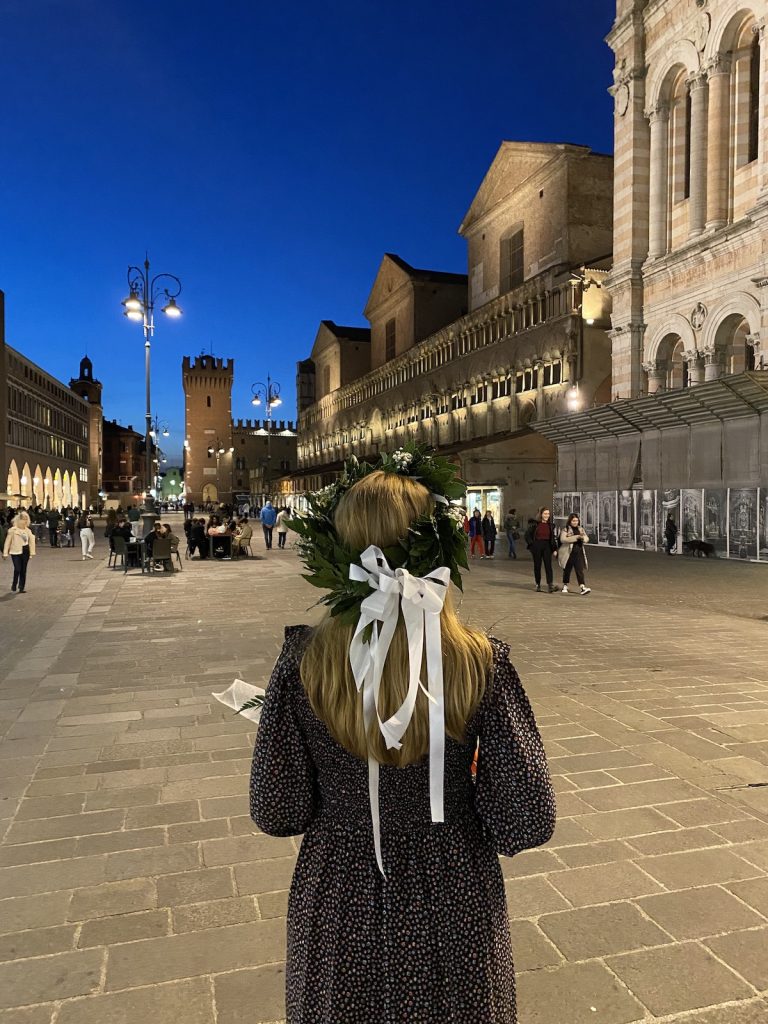As someone from the UK, I used to have a very clear, anglicised vision of what the ultimate finale to university studies, graduation, would be like. This outlook completely changed, however, after completing a master’s at the University of Ferrara, when I learnt that graduation in Italy is quite another matter, and infinitely more nerve-wracking.
Entering a New Chapter
University is an important stage in any student’s life. It’s also the first time education is pursued by choice, the so-called ‘further education’. It therefore comes as no surprise that the end of these arduous years of studying is climaxed by the momentous occasion that is the famous graduation. This joyful celebration concludes years of hard work, ending one chapter of life and opening up numerous possibilities and pathways for the next.

Whilst the structure of university academia may vary from country to country, it can be said that most students find a special way to celebrate their graduation. This may also differ according to country customs. Being British, my perspective of graduation was always donning a black gown and square black cap with a tassel (commonly known as a mortarboard, its shape believed to signify a book in recognition of scholarly achievement), whilst walking across a stage in front of my family for the diploma presentation. This was exactly the case at my UK university and seems to hold true UK-wide.
Little did I know that, on signing up for a master’s degree in Italy, I would also be signing up to a vastly different type of graduation at the end of my two ‘exam-filled’ years. The graduation process in Italy contrasts greatly to that of the UK and, in many ways, now that I have completed both, I fully understand why Italian students tend to be more nervous about their graduation day than their British counterparts.
Thesis Presentation
The first thing to be aware of is that graduation day in Italy is the same day that students present their thesis and subsequently respond to a selection of questions asked by a board of professors. A week or so beforehand they are allocated a slot for their presentation with a handful of fellow students. They enter this with their average score from previous exams, anxiously awaiting the grade they will receive from their thesis presentation, to determine their final grade. The total score is a maximum of 110, with the possibility of ‘lode’ being awarded in addition, signifying ‘honours’ or ‘praise’, for outstanding students.
Whilst the idea of presenting a thesis in front of a board of professors and other students might seem stressful enough, in many ways this is an understatement. In actual fact, like most exams in Italy, thesis presentations are open. This means that parents and friends are free to come and watch (which may be a help or hinderance depending on a student’s outlook).

The Big Moment
With the presentations completed, there is a short break whilst the professors deliberate the grades and tension mounts for the students. Then, finally, the big moment arrives – the presentation of the marks. Grades are given and certificates are awarded (larger and more ornate compared to those presented in the UK), followed by the crowning of the laurel wreath – the Italian equivalent of the British graduation cap. The history of the laurel wreath traces back to Ancient Greece and symbolises victory, with the God Apollo famously adorning one. This makes it very apt for the symbol of educational victory that is graduation.
With the official graduation process complete, the students are then free to celebrate in any way they please, most going out with friends and family for celebratory drinks and a meal. Of course, it is impossible to talk about graduation in Italy without mentioning the infamous graduation song which you may hear if you pass by a group of celebrating graduates in Italy. This starts with ‘dottore, dottore, dottore’ and ends with a rather rude couple of phrases which I will spare you the details of here. The lyrics of this song have the intention of reminding the new graduate to keep their feet on the ground despite their newly esteemed position as a ‘dottore/dottoressa’.
Complimenti!
One final note to mention – there are a couple of ways to congratulate someone who has newly graduated. So, if you’re in Italy and pass by a graduate, maybe try one of the following sayings: Congratulazioni per la tua laurea! or Complimenti! And don’t be shy to throw in a ‘dottore/dottoressa’ at the end – it is, after all, the point of pride for any graduate!


Are there different wreaths for different degrees earned?